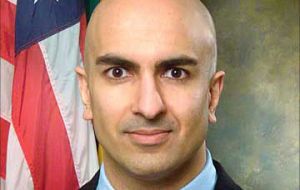MercoPress. South Atlantic News Agency
Space engineer named to unclog “toxic” banking mess
 Kashkari, Paulson most trusted adviser selected for the mother of all challenges
Kashkari, Paulson most trusted adviser selected for the mother of all challenges Neel Kashkari, 35, a United States Assistant Secretary of the Treasury, was named on Tuesday interim head of the Office of Financial Stability by US Treasury Secretary Henry Paulson. The office will run the 700 billion US dollars financial bailout program signed into law Friday.
The former Goldman Sachs vice president came to Washington in 2006 to be a senior adviser to Paulson, the Goldman CEO who had been named Treasury secretary. But Kashkari's introduction to Washington was in 1990, when he came with his father, who had won a presidential award for helping get water supplies into ten African villages. The senior Chaman Kashkari landed in the US from India 42 years ago through a Christian missionary group that helped him enrol in the University of Detroit. A year later his wife joined him. He says he came with the promise that he was going to "use technology to eradicate hunger and poverty in the world." Now, his son is the point person on an attempt to eradicate a credit crisis that has reverberated in markets around the world. He must implement the bailout that he helped Paulson devise in recent weeks. The senior Kashkari says his son brings an intense sense of organization to the job. "When he does anything, if you ask him to make an electric car or ask him to plan an outing to Niagara Falls, he is so meticulous," says his father. "He has the power of organization. He immediately knows who he needs for a job. ?Whatever he does, he puts his heart and soul into it." Kashkari grew up in a tight-knit family that made trips back to India every few years. Education was valued: His father has a doctorate in electrical engineering, his sister is a doctor of infectious disease and his mother is a retired pathologist. After studying engineering at the University of Illinois, where he met his wife, Minal, he worked for three years at TRW on NASA projects before enrolling in the Wharton School to get an MBA in finance. In the transcript of a September 19 conference of the American Enterprise Institute, he talks about some of the philosophical conflicts he's faced recently about market intervention ? and will face even more in his new job. "I am a free-market Republican," Kashkari said in the presentation on mortgage alternatives. He spoke about trying to help people keep their homes as the mortgage crisis unfolded. "For the last year one of the things I've been doing with Treasury is working with all the (mortgage) services and counsellors to get them to mobilize. But markets are strained right now. It's hard to say, as much as I would like to believe, let them (be) free, we're under a lot of pressure right now." According to Paulson, Kashkari is as good as there is at this caper, so he's being let loose on Wall Street where his immediate tasks are to identify the toxic assets the US Government must buy and establish the prices it will pay. Kashkari will also be responsible for setting up some kind of institution to hold the assets until they're sold, hopefully at a profit. But not everyone is impressed with the selection of Kashkari to run the bailout unit. Former director Federal Reserve Bank of Atlanta director Robert Eisenbeis said Paulson should have chosen someone familiar with the Savings and Loan Crisis of the late 1980s and early 1990s when the US Federal Reserve created the Resolution Trust Corp to dispose of billions of dollars of assets from bankrupt banks. "The kind of people that you need is the ones who were associated with RTC and had experience dealing with these large volumes of assets," Eisenbeis told AAP. "Working at Goldman Sachs doesn't qualify you".




Top Comments
Disclaimer & comment rulesCommenting for this story is now closed.
If you have a Facebook account, become a fan and comment on our Facebook Page!